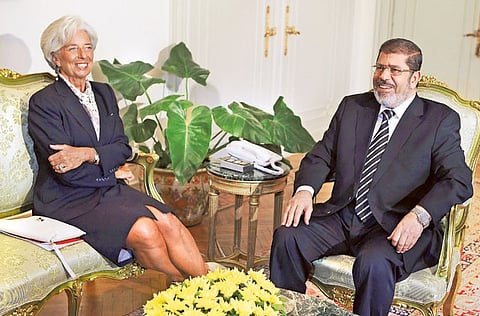Egypt says formally requests for $4.8b IMF loan
Egypt’s fiscal and balance of payment problems have worsened since last year

Cairo: Egypt requested a $4.8 billion (Dh17.63 billion) loan from the International Monetary Fund and hopes for a deal by the end of year, officials said during a visit on Wednesday by IMF chief Christine Lagarde to discuss helping the ailing economy.
Egypt said last week it would discuss a bigger-than-expected loan from the fund, whose support could help to stave off a balance of payments crisis and rebuild confidence of investors who fled during 18 months of political turmoil.
Egypt’s military-appointed interim government had been negotiating a $3.2 billion package before it handed power to President Mohammad Mursi on June 30. The deal was not finalised.
“We have officially requested a $4.8 billion loan from the IMF,” presidential spokesman Yasser Ali said as Lagarde met the president. An IMF official confirmed the request.
During earlier talks, army officials had voiced some concerns about extending the nation’s debts under their watch, while the IMF had insisted that any agreement receive “broad political support”.
Mursi’s group, the Muslim Brotherhood, at the time declined to support any deal, saying the then government had not given it enough information to show how the money would be used. The Brotherhood at that point had nearly half the seats in parliament.
Lagarde’s visit signals a fresh determination on both sides to seal a long-awaited accord after Mursi, who took office on June 30, appointed his first government last month.
“The objective ... is to improve stability, to restore confidence with a view to encouraging investors to invest and create jobs, to reduce the financial burden of very high financing terms,” Lagarde said after meeting top officials.
She said the IMF would look at fiscal, monetary and structural issues. “We will be discussing engaging in a dialogue but at the end of the day ... it’s an Egyptian journey and the IMF is a partner in that journey,” she said.
Speaking at a joint news conference with Egyptian Prime Minister Hisham Kandil, she added that talks would continue on Thursday and an IMF team would make further visits to Egypt.
Kandil said he expected the IMF loan would be for five years
with a grace period of 39 months and interest rate of 1.1 per cent, but said details were still being discussed.
“God willing there will be an agreement on a map for work extending to November or the beginning of December during which the loan will be signed with the IMF,” he said.
During 18 tumultuous months since the overthrow of autocratic leader Hosni Mubarak, successive Egyptian governments negotiated with the IMF to secure emergency funding. An army council took charge after Mubarak fell on February 11, 2011.
Running out of options
Egypt’s fiscal and balance of payments problems have worsened. An exodus of foreign investors in the wake of the turmoil left local banks shouldering much of the short-term and other lending to the state.
The government in the 12 months to end-June also borrowed nearly $12 billion, or about 4.5 per cent of GDP, directly from the central bank, an unusual measure indicating it was running out of options to finance its budget deficit.
Foreign reserves have fallen to well under half levels seen before last year’s popular uprising against Mubarak and investors’ reluctance to return is born partly of fears that a sharp currency devaluation could wipe out any returns.
An IMF deal would help Egypt to add credibility to economic reforms needed to restore investor confidence.
Based on government figures, the budget deficit for 2012/2013 will represent 7.9 per cent of gross domestic product (GDP), down from 8.2 per cent a year earlier. But most economists forecast lower GDP growth than the government’s estimate of 4-4.5 per cent.
Tax receipts have suffered from a weak economy and the previous government boosted spending to meet popular demands for better living standards after Mubarak’s overthrow.
Aid promised by foreign donors last year was largely absent until June, when funds arrived from Saudi Arabia. It transferred $1.5 billion as direct budget support, approved $430 million in project aid and said it would allow Cairo to use a $750 million credit line to import oil products.
Qatar also pledged $2 billion in support this month.
Sign up for the Daily Briefing
Get the latest news and updates straight to your inbox



